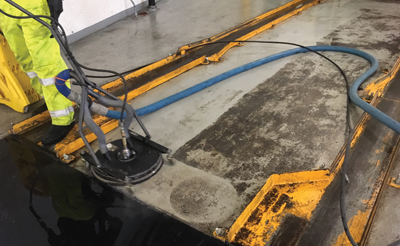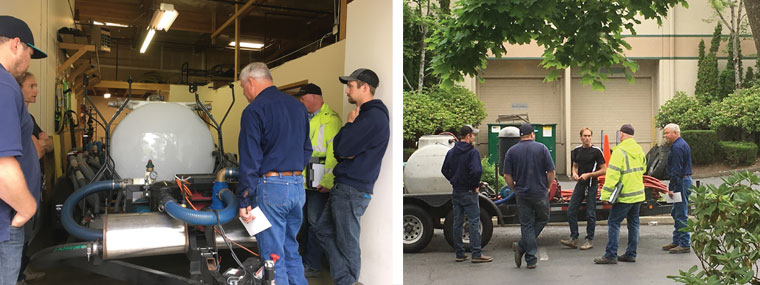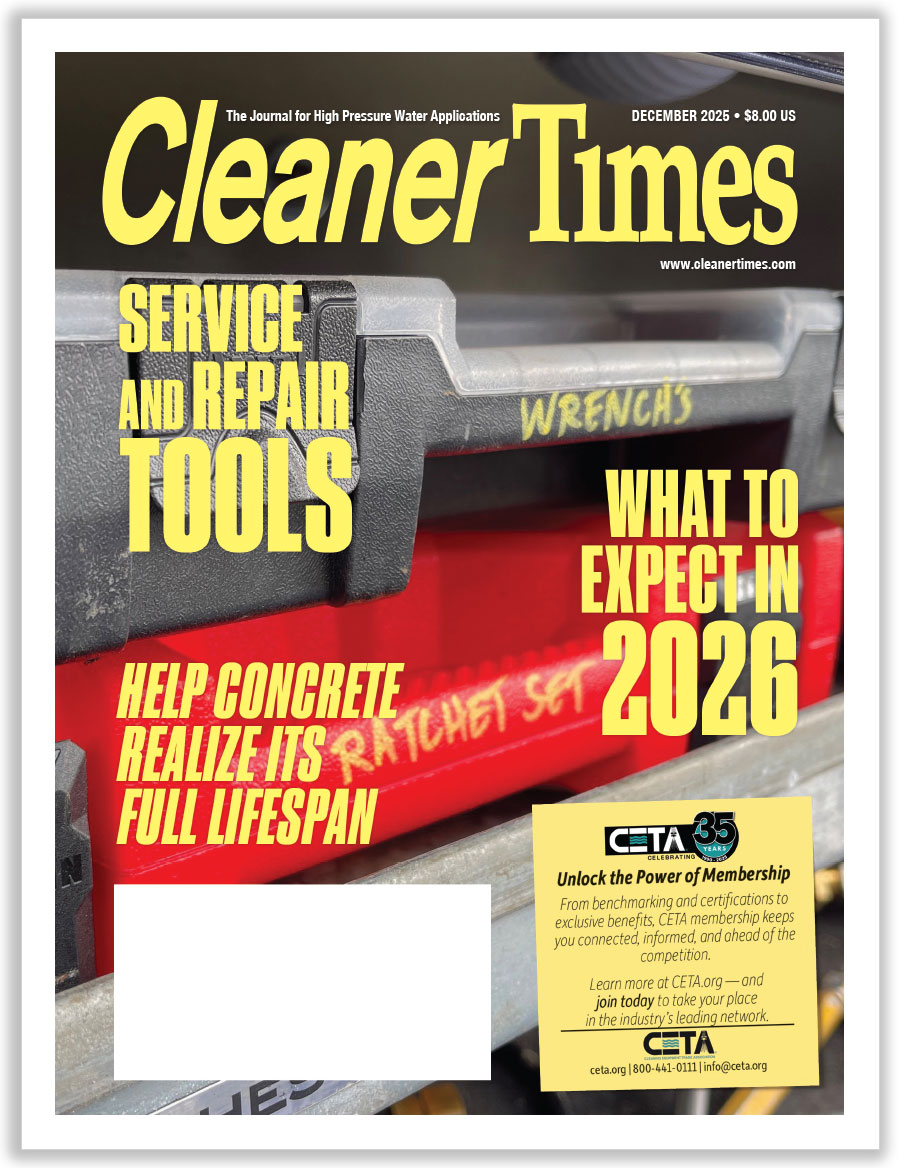
Cleaning Coast to Coast
Washington—The Evergreen State… Where Power Washing Opportunities Abound!
By Terri Perrin / Published June 2023

W
ashington By The Numbers
With over 7.7 million people, Washington state (WA) ranks 13th in the country by population. At 71,000-plus square miles (almost 185,000 km2), it’s the 18th-largest state by size. But according to pressure washing industry experts, the state would rank near the top (if such a ranking existed) for best pressure washing opportunities in the USA.
Washington has been nicknamed “The Evergreen State” for its abundance of evergreen forests. But, perhaps it should be dubbed “the water state” because water is WA’s most valuable and most versatile natural resource. The leading freshwater source is the series of dams on the Columbia River drainage system that impound water for irrigation, hydroelectric power, and flood control while also providing for navigation, fisheries, recreation, and industrial uses. The state’s coastal location and excellent harbors also ensure it has a leading role in trade with Alaska, Canada, and the Pacific Rim. While a blessing, in general all this water and a shallow natural aquifer also present challenges for power washing contractors because wastewater recovery here is a must.
The terrain and climate divide Washington into a rainy (and more highly populated) western third and a drier eastern two-thirds. This diverse geography results in an array of industries, including agriculture, high tech, forestry, fisheries, mining, manufacturing, tourism, exports/imports, and more. This business diversity in itself means opportunities for power washers; and we are told that when one industry gets seasonally or economically slow, others help pick up the slack.
Just over half of all Washingtonians live in the highly urbanized area around the Puget Sound, which includes the Seattle metro area (the largest city), Everett, Tacoma-Bellevue, and other cities.
Whatever The Weather
From the perspective of life-long Washingtonians, Washington summers are hot and muggy. Winters are short and cold. It is rainy and partly cloudy year round. Over the course of the year, the temperature typically varies from lows around 35°F (1°C) to highs in the 90°F range (32°C). Some folks jokingly say that it rains so much in Seattle that a sunny day might make headline news. Rainy weather aside, it’s interesting to note that Washington is the second largest wine-producing state, after California. It has nearly 1,000 wineries and gets two hours more sunshine per day than California during the growing season, but it’s not grape growing that provides opportunities for pressure cleaning. Instead, it’s moss, mold, and mildew.
In western WA, the mild temperatures and wet weather result in the perfect conditions for continual organic growth. Sometimes the moss gets so thick that you could scoop it up with a shovel. Commercial buildings, parking garages, and residential gutters and roof cleaning are huge opportunities here, not just for the aesthetics.
Mosses have small hairlike structures called rhizoids, which allow the moss to latch on to any surface (such as roof shingles) and flourish. Cedar shakes were predominantly used in residential roofing construction in WA. As old growth forest supplies have been reduced, since the 1990s asphalt shingles have been more commonly used here.
Power Washing Opportunities
The large number of international companies headquartered in WA—Starbucks, Amazon, Boeing, Micro-soft, SpaceX, and Nordstrom, to name a few—means that there are many different types of companies that need power washing services. Power washing can (usually) be done 12 months of the year here, although it is not uncommon to schedule jobs such as interior parking garages in the winter because it is warmer inside the structures.
Russ Meyer is the sales manager for Seattle-based Ben’s Cleaner Sales Inc., which has been serving Seattle and the surrounding areas since 1945. Ben’s is a distributor/supplier offering a full line of new and used equipment, parts, accessories, chemicals, and more for residential, commercial, and industrial cleaning needs. They carry many of the major pressure washer brands, including Mi-T-M, Alkota, Whitco, Kärcher, HydroTek, BE Pressure, and others. Russ and several other family members are the third generation to work at this family-owned business.
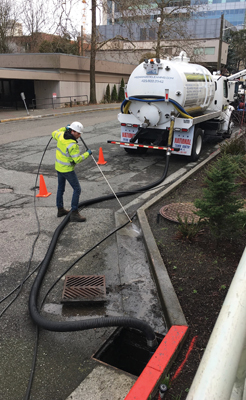
“Our port brings many opportunities for our industry,” says Meyer. “Semi-trucks, excavators, and vehicles that are shipped here from overseas need to be decontaminated with 220°F water to remove potential invasive particulates that may include anything from plant matter, microorganisms, and bacteria. Boats, semis, and other traffic coming in and out of the port also need to be cleaned. And, when a ship comes in, there are thousands of containers on board that may need to be cleaned. In addition, considering that we border the Pacific Ocean, the fishing industry is big when it comes to the sale and servicing of power washing equipment and supplies used on the big fishing boats and in the processing plants,” Meyer points out.
“The number one thing, in order to be responsible contractors,” insists Bing Zimmerman, president and
co-owner of Outlook Exterior Maintenance Inc., “is to avoid water ending up in the Puget Sound [or any other water body]. Whether we are doing standard pressure washing or building restoration, wastewater must either be captured and filtered on site and then directed into a soil area or captured and plumbed directly into the sanitary sewer system. And you MUST know the difference between the sanitary sewer and storm run-off systems. Noncompliant contractors and untrained individuals aspiring to be power washers are a challenge to our industry.”
Bing and his wife Krista Zimmer-man, the company’s VP, bring a wealth of varied experience to the industry in WA. Bing started in the high-rise industry over 25 years ago and has both the personal and technical expertise. Krista’s proficiency is in the office and financial management of their company. Together, they firmly believe that “protecting the environment is protecting ourselves.” This attention to environmental consciousness governs everything they do.
“Total transparency with your customers is vitally important,” believes Zimmerman. “You have to know what you are doing. Mentorship in this industry is vital, too. I encourage contractors to contact their suppliers for guidance. You have to be involved and always be mindful. Power washing is not ‘just a job’; it is a career, and you have an obligation to your customers and the environment. We all must be responsible for what we do.”
Zimmerman adds that WA’s rainy weather in itself provides unique challenges. “A lot of the surfaces we are called to clean are wet when we arrive on site,” he says. “The surface may look great when it’s wet, so you can miss spots or leave wand marks. We have to be vigilant about being systematic in our cleaning methods to ensure we do a thorough job. We give the customer realistic expectations and match those expectations with performance. A concrete wall covered with moss or mold, for example, will have varying degrees of cleaning success due to erosion and organic growth. Discoloration is often a problem. We live with what we have and make the best of it.”
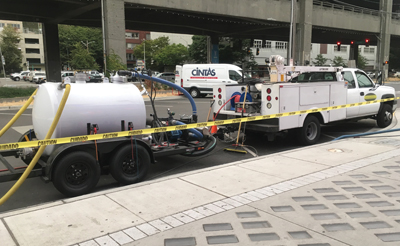
Environmental Impact
With its proximity to so many natural waterways, the introduction of the federal Clean Water Act (CWA) in 1972 had huge implications for water use nationwide, but especially so for power washing businesses in WA. With its goal of preventing water pollution, obtaining discharge permits, meeting applicable water quality standards, developing risk management plans, and maintaining records, the CWA put pressure on power washers to ensure “nothing goes down the drain but rain.”
Ben Shrope, company owner and president, explains that Mechanized Cleaning Solutions Inc. is a niche contracting business local to Redmond, the Seattle area, and the Greater Puget Sound. The company has co-evolved as a contract cleaning company, with a special interest in ecological cleaning solutions. Shrope recalls that “stormwater-friendly pressure washing” was a novelty when he started working with his father some 25-plus years ago. Today, it’s expected in most areas where he works.
“The CWA laws have been in place for decades, and the rules are the same almost everywhere in the United States. However, in the unassuming city of Redmond we have some of the strictest municipal stormwater inspectors in the entire country. Redmond gets its drinking water from an aquifer very near the surface. Any contaminants discharged into the environment end up in our tap water. We have uniquely adapted our business for this city in particular and the state in general. Our phone rings more now because many contractors in our area of operations don’t want to invest the time and energy into developing and custom building the proper water reclamation equipment, which actually works and doesn’t constantly break down—it’s expensive. A big part of my job is to educate clients with regard to how to do this work properly.
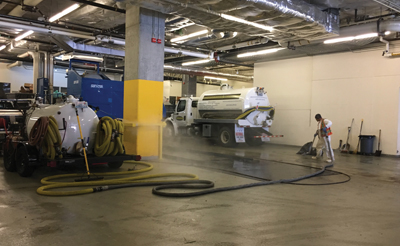
“I have found that the best policy is to let people know what their options are. I get good results when I am honest and have an authentic interaction. For potential customers who don’t agree with our methods—specifically, getting more expensive vacuum equipment and more complicated tactics involved to prevent a wash water discharge to vulnerable stormwater catch basins—I’m happy to let them go and find another solution that works better for them. I prefer to educate rather than proselytize (or pressure) and let our clients make up their own minds, because that is how I would want to be treated.”
Shrope initially found that acquiring parts and equipment for water reclamation to meet the special challenges in the WA region has been difficult, so they came up with their own solution.
“We took this to a whole new level with purpose-built vacuum trucks and trailers,” claims Shrope. “Most customers (and some contractors) don’t realize how much work goes into a project that has nothing to do with the actual cleaning. In the past, a six-hour power washing contract could result in our team having to spend another six hours cleaning the equipment. I realized that I had to design and build something on my own, or I would never be able to scale these operations. We are at the point now that the equipment we developed makes cleanup and disposal a breeze. We are in the process of creating a YouTube channel to help other contractors get past this painful speedbump to pick up wash water and do it on scale.
“Any pressure washing contractor aspiring to transform their outfit into a stormwater-friendly operation,” adds Shrope, “is in for a rude logistical awakening, and the unfortunate truth is that most contractors give up after a short time. The crux of the problem in reclamation pressure washing is finding some way of taking in a mixture of, and of separating, thousands of cubic feet of air from many hundreds of gallons of water and many pounds of sediment per hour, and then being able to maintain this rate of reclamation over many consecutive hours in a working day while also making the process affordable and competitive. No easy challenge, but it’s something I believe we are exceptionally good at. If a contractor is able to solve this specific problem, they will be ready to move into the 21st century with a huge operational advantage!”
Business Challenges
Considering that in WA you are only allowed to cover a certain amount of your property with an impervious surface (i.e. concrete/asphalt), one way that WA municipalities have attempted to deal with the issue is to allow the installation of pervious or porous surfaces that allow stormwater runoff to infiltrate into drainage layers and the underlying soils below, meaning “zero discharge.” This method, however, is not without its drawbacks. The porosity of these new surfaces allows moss to flourish, and blocked pores means no drainage, so water collects on the surface. In other states with road salt and freezing temperatures, this concept simply would never work.
Finding workers at a cost-effective price is also an ongoing challenge. With so many high-tech employers, blue collar workers in this geographical area are hard to find. On the other hand, there is enough work for everyone in the contract cleaning business.
Zimmerman explains that getting access to clean residential properties has often been a challenge. To solve the accessibility problem, they invested in the “Blue Lift 72” that allows them to drive onto lawns without damaging the substrate.
Misconceptions about the cleanliness of WA are also confounding—our interviewees said that the way you view big cities like Seattle on a TV show doesn’t reflect reality. Behind the scenes, the Seattle metro area is dirty. Graffiti is rampant, there are few repercussions for “artists” who choose to deface structures with their work, and business owners are held responsible to clean up the graffiti according to a city Graffiti Nuisance Ordinance (https://tinyurl.com/46yt97eh). That said, the proverbial silver lining is that graffiti removal keeps power washers busy.
Other not-so-pretty opportunities come in the form of power washing crime scenes and areas where unhoused people congregate… including clean-up of feces, drug paraphernalia, and more.
Grime, crime, and graffiti aside, everyone we spoke with touted the pure beauty of the state and proximity to a wide range of outdoor recreation opportunities within minutes (or just a few hours) from the highly populated Puget Sound area to be big advantages of living and working in Washington state. For power washers, “evergreen” translates to a need to be “ever clean,” so you will never be without work.
